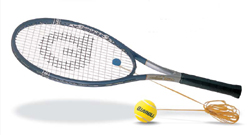| ||||||||||||||||||||||||||||||||||||||||||||||||||||||||
|
)  The earliest origins of tennis are a matter of some dispute. One side believes that the ancient Egyptians, Greeks, and Romans played a precursor1 to tennis. Drawings or descriptions of any tennis-like games have not been discovered, but a few Arabic words dating from ancient Egyptian times are cited as evidence. The theory says that the name tennis derives2 from the Egyptian town of Tinnis alongside the Nile. The earliest origins of tennis are a matter of some dispute. One side believes that the ancient Egyptians, Greeks, and Romans played a precursor1 to tennis. Drawings or descriptions of any tennis-like games have not been discovered, but a few Arabic words dating from ancient Egyptian times are cited as evidence. The theory says that the name tennis derives2 from the Egyptian town of Tinnis alongside the Nile. 一种说法是关于网球的起源,古埃及,希腊和罗马是网球的发源地。在古埃及时代,尽管没有相关的古代刻画图形作为证据,但是,却发现了很多阿拉伯单词。有理论说,网球这个单词起源于尼罗河畔的一个名为Tinnis的古埃及小镇。 Aside from this word, evidence for any form of tennis preceding the year 1000 is lacking, and most historians credit the first origins of the game to 11th or 12th century French monks3, who began playing a crude handball against their monastery4 walls or over a rope strung across a courtyard. 除了这个单词,关于网球一千年前的情况,并没有历史记载。但是大多的历史学家把其历史归于11,12世纪的法国和尚,这些和尚曾拿着粗糙的球打向寺院的墙壁,或者打过栓在院子里的绳子。 The game took on the name jeu de paume, which means "game of the hand." Many who dispute more ancient origins argue that tennis derived5 from the French tenez, which meant something to the effect of "take this," said as one player would serve to the other. 这种和尚所玩的游戏在那时被叫做 jeu de paume,意思是“用手玩的游戏”。但是还有人说其起源于法国的 tenez一词,意识是“接住”,也就是一方球手在发球时对另一方球手所说的词语。 As the game became more popular, courtyard playing areas began to be modified into indoor courts, where the ball was still played off the walls. After bare hands were found too uncomfortable, players began using a glove, then either a glove with webbing between the fingers or a solid paddle, followed by webbing attached to a handle -- essentially6 a racquet. Rubber balls were still centuries away, so the ball was a wad of hair, wool, or cork7 wrapped in string and cloth or leather, then in later years, hand-stitched in felt to look something like a modern baseball. 随着这种运动越来越流行,玩耍场地也由室外改为室内的小方地,但是那时的玩法仍然是将球扔向墙壁。但后来人们发现,光着手玩,手会感觉非常疼痛,就开始想了一个办法,将手指间缠绕布,或者用一个结实的拍子,后边带一个把手,把手上缠绕着布,其实在那时就具有了球拍的雏形。但是橡胶球仍然是几个世纪以后的事情。那时的球,是一团头发丝,或者羊毛,或者用细丝,布或者皮毛等缠绕的软木块。随后的年代,人们发明了用手织出的球,类似现在的棒球。 点击  收听单词发音 收听单词发音
|
||||||||||||||||||||||||||||||||||||||||||||||||||||||||
上一篇:排球运动:美国教授发明Volleyball 下一篇:奥运项目介绍—拳击运动 |
||||||||||||||||||||||||||||||||||||||||||||||||||||||||
TAG标签:
- 发表评论
-
- 最新评论 进入详细评论页>>



